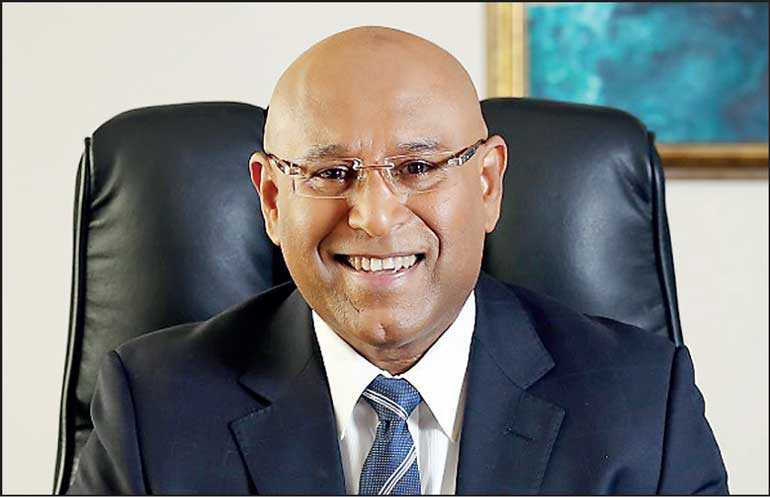Monday Feb 16, 2026
Monday Feb 16, 2026
Thursday, 14 November 2019 00:00 - - {{hitsCtrl.values.hits}}


National Development Bank PLC said yesterday it has recorded yet another quarter of resilient performance against a challenging operating environment and an industry climate marked by slow growth, recording a pre-tax profitability of Rs. 7.6 billion, a YoY growth of 11%.
The Bank’s Profit after Tax was Rs. 3.4 billion for the period, a reduction of 13% over the comparative period [Q3 2018], impacted by the Debt repayment Levy which came into effect on 1 October 2018. Profit Attributable to Shareholders [PAS], including the performance of the Group companies was Rs. 2.9 billion, a reduction of 14%, over the comparative period.
NDB Director/ Group Chief Executive Officer Dimantha Seneviratne stated that the results recorded by the Bank for the nine-month period is a strong reflection of the Bank’s ability to manoeuvre through challenging conditions and ensure sustained results generated for the benefit of all stakeholders of the Bank. The GCEO was hopeful that the overall economy as well as the banking industry will be in a better pitch for elevated performance in 2020, with greater political and policy stability with the conclusion of the Presidential Elections in November 2019.
“We have placed a lot of focus on streamlining our internal processes, strengthening internal systems, up-skilling our staff, product offerings, digital capabilities, etc., such that we will be in a firm footing to re-launch accelerated growth once the external environment is stabilised,” he stated.
Analysis of financial performance
Income
Gross income grew by 19% to Rs. 43.9 billion, mainly bolstered by growth in Net Interest Income [NII] and net fee and commission income. NII grew by 23% YoY to Rs. 13.1 billion, supported by the expansion of the loan book by 10% [Rs. 36.4 billion quantum growth] and a net interest margin of 3.40%. Net fee and commission income recorded a growth of 21% to Rs. 2.8 billion, making a 16% contribution towards total operating income. Increases in the loan book as well as the thrust in the Bank’s digital financial services propelled the growth in the fee based income.
Net gains from trading were Rs. 766.5 million, a reduction of 11% over the prior period. Net gain from financial investments at fair value through Profit or Loss was Rs. 2.9 million whilst net gains from de-recognition of financial assets increased by 58% to Rs. 663 million, due to the proactive interest rate risk management initiatives undertaken in a volatile market environment. Other operating income in the meantime saw a reduction of 79% to Rs. 303.7 million resulting from the exchange losses incurred on the revaluation of the foreign currency reserves of the Bank, which was due to the appreciation of the Sri Lankan rupee during early 2019 in comparison to the depreciation of the Sri Lankan rupee in the comparative period in 2018.
Impairment charges for loans and other losses
The impairment charge for the nine months ended 30 September 2019 was Rs. 2.9 billion comprising individual impairment of Rs. 2.1 billion and collective impairment reversal of Rs. 561 million, as compared to Rs. 2.7 billion for the comparative period. Other provisions were Rs. 185 million and represents provision made for permanent diminution in fair value of investments. The higher impairment charge was mainly due to provisions made at individual levels considering the elevated risks identified in the current slow economic environment. The Bank is mindful of the stresses experienced in the industry and is continuously reviewing the collection and recovery process to minimise the high impairment loss effect to the Bank.
NDB’s strong risk management initiatives including comprehensive credit evaluation standards, post disbursement follow-ups and underwriting standards have enabled the Bank to manage the loan book quality amidst challenging macro-economic conditions and industry stresses. The Bank’s non-performing loan [NPL] ratio, which has been on an upward trend since end 2018 increased to 4.93%, reflective of the wider industry trajectory for NPLs.
Total operating expenses
Total operating expenses for the nine months period were Rs. 7.2 billion, an increase of Rs. 16% YoY. 52% of the expenses were in personnel expenses, which saw a 14% increase to Rs. 3.7 billion, applicable to an employee base of 2,885. Depreciation and amortisation of Rs. 393 million increased by 23% mainly due to the investments the Bank made in its digital journey, which includes the Bank’s flagship phygital branch NDB NEOS and a network of cash recycle machines exceeding 50. The resultant cost to income ratio of the Bank was 40.7%, and compares with a ratio of 39.2% in Q3 2018. During 2019, the Bank deployed a large number of process improvements using work flow solutions, robotic process automation technology, installation of new IT systems for few products, etc., efficiencies of which are expected to be reflected in an enhanced cost to income ratio in the coming months.
Taxation
Total taxes for the period under review was Rs. 4.2 billion, comprising VAT on financial services, Nation Building Tax on Financial services, Debt repayment Levy [DRL] and income taxes. Rs. 757 million was incurred as DRL, which was introduced in the latter part of 2018. 56% of the Bank’s operating profit before taxes has been paid as taxes in Q3 2019, compared to 43% in Q3 2018.
Balance sheet growth and funding
NDB made a historic milestone in Q3 2019, by crossing Rs. 500 billion in total assets, to reach Rs. 505 billion at the Bank level and Rs. 511 billion at the Group level, at a year-to-date [YTD] growth rate of 7%, commendable within the subdued growth experienced across the industry. This marked the achievement of one of the goals of NDB’s Transformation 2020 strategy launched in 2017, which was to attain a balance sheet size of Rs. 500 billion by end 2020.
Gross loans grew by 10% to Rs. 390 billion YoY, which translated to a quantum growth of Rs. 37 billion. This was a 17% YoY change over September 2018, with a quantum growth of Rs. 56 billion. Traction was seen in both consumer loans and long term loans segments. The Bank’s penetration to granular levels of the society through its financial inclusion initiatives and digital banking solutions have enabled the Bank to broad base its customers and risks, and thereby maintain a healthy portfolio growth.
In terms of funding the balance sheet growth, deposits grew by 8% YTD, to reach Rs. 374 billion, which was an increase of Rs. 27 billion over December 2018. The YoY deposits growth from September 2018 to September 2019 was 14%, an equivalent of Rs. 46 million. Sourcing deposits was a challenging task for the industry within the deposit rate cap which was in effect from April till late September 2019 and the uptick seen in capital markets providing more attractive investment options.
The challenge for sourcing deposits was deepened for CASA deposits, where the CASA base saw a marginal increase to reach Rs. 76 billion as at 30 September 2019. The Bank experienced an outflow of few large CASA deposits, especially in foreign currency during the first half of 2019 resulting in a contraction in the CASA portfolio. However, the steady growth seen in granular CASA portfolio coming from the Bank’s branch network supported the CASA growth.
The other key source of funding during the year was raising Rs. 5.6 billion via Basel III compliant Tier II debentures to strengthen the Bank’s Tier II capital base of the Bank. Equity capital infusion plans to boost Tier I capital of the Bank is well underway and making sound progress.
Capital adequacy
The Tier 1 and total capital adequacy ratios of the Bank as of 30 September 2019 were 9.52% and 14.01% respectively. The same ratios for the NDB Group were 10.56% and 14.81%.
Hither to the existing regulatory directions, the Bank is deemed to be a Domestic Systemically Important Bank [D-SIB] with its total assets in excess of Rs. 500 billion, and the minimum capital adequacy ratios applicable are 10% and 14% for Tier I and total capital respectively.
However, the Regulator is in the process of finalising the new assessment methodology for D-SIBs, where the assessment of D-SIBs will be based on multiple factors such as size, inter-connectedness, substitutability and complexity. Accordingly, new banks passing the threshold of Rs. 500 billion in asset size at present may not be selected as D-SIBs under the new framework and hence will not be required to meet the enhanced capital adequacy requirements currently applicable for D-SIBs. The above position has been confirmed by the regulator to the Bank.
Therefore the Bank’s minimum regulatory capital requirement for Tier 1 and Total capital remains at 8.5% and 12.5% respectively, where the current ratios for the Bank stands at 9.52% and 14.01% respectively. In the meantime, the Bank is continuing with its Capital augmentation process to support the Bank’s long term growth aspirations.
Investor returns
Resulting from the overall performance of the Bank for the nine months under review, the Bank recorded a Return on Average Shareholder Funds [ROE] of 11.83% [2018: 17.41%] and an Earnings per Share of Rs. 19.27 [2018: Rs. 28.44]. The same ratios for the Group were 9.64% [2018: 14.26%] and Rs. 17.38/- [2018: Rs. 27.98] respectively. Return on Average Assets was of the Bank was 1.99% [2018: 2.22%] and for the Group 2.0% [2018: 2.17%]. The Net asset value per share of the Bank in the meantime was Rs. 167.90 [2018: 166.41] and the same ratio for the Group was Rs. 184.83 [2018: Rs. 185.49].
NDB was recognised as the Best Bank in Sri Lanka 2019 by Asia Money, and the Winner - Sri Lanka in the World’s Best Consumer Digital Banks Awards 2019 conducted by Global Finance of USA.
With a rich history of 40 years in serving the nation and its people towards financial prosperity, the Bank is committed to many more years of excellence.